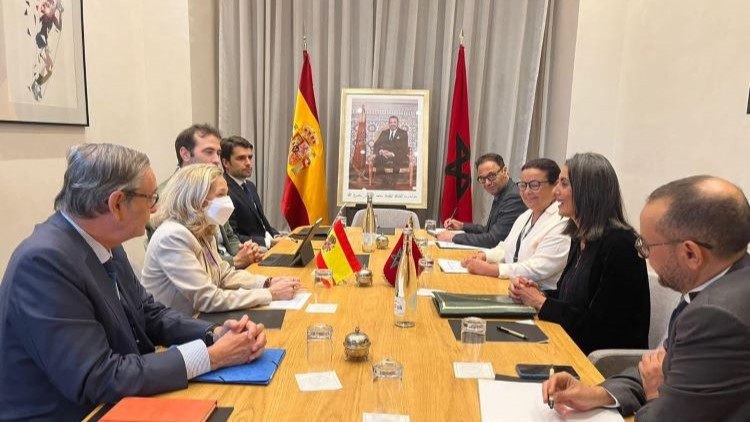Juan David Latorre
Last Monday, the Embassy of Azerbaijan held in a central hotel in Madrid a European Forum on Forced Expulsion and Refugees: The Violation of Women’s Rights Related to Deportation.
In his welcoming speech, Ambassador Ramiz Hasanov described the refugee problem and the violation of women’s rights in connection with deportation as “relevant and important”. “As representatives of a nation, we have debates and understand the pain of these people. Our history is marked by circumstances like these. Azerbaijan has had the problem of its refugees and expelled citizens for years.”
After reviewing the history and the conflict with Armenia and the expulsion of Azerbaijanis in the late 1980s from Armenia, Ambassador Hasanov underlined “the efforts currently being made by the Government of his country to reconstruct the recovered territories, as well as the reintegration of Armenian residents in Karabakh and humanitarian care for them to enjoy their rights, as dictated by our Constitution. Azerbaijanis and Armenians can perfectly well live in peace”.
The forum consisted of two panels: (I) European perspective on the refugee crisis: challenges and possible solutions through international cooperation, in which EU policies on forced expulsion and deportation, protection and integration strategies and the problem of refugees, displaced persons and migration were discussed.
The second panel addressed (II) Azerbaijan’s experience in forced expulsion and refugee crisis, discussing international legal frameworks and obligations, the current situation of Azerbaijani refugees forcibly deported; the impact of displacement on individuals and communities and the return6 of Azerbaijani refugees, existing working mechanisms and strategies aimed at protecting their rights.
Of particular note was a video message from Ryszard Czarnecki, a Polish Member of the European Parliament. Key participants included Samuel Doveri Vesterbye, Director General of the European Neighbourhood Council; Sabir Rustamkhanli, Azerbaijani poet and Member of Parliament; and Aziz Alakbarli, President of the Community of West Azerbaijanis, along with photographer Reza Deghati, who showed the rawness and suffering of the refugees through his snapshots.
Speaking to The Diplomat, photographer Reza Deghati commented on his 14 years of experience travelling around the world “especially to the areas of conflict, war and revolution, natural disasters where humanity suffers, where humanity is at its lowest, where women and children suffer and are in need and are the main victims of war and refugee situations, and so living with them was the way I was taking pictures, not staying in hotels, not going to take pictures and coming back. I stay with them, I live with them, I spend time talking to them, asking them questions, getting the whole story and little by little I see that the face becomes natural, I see that the first interpretation in front of the camera is gone and the people became natural and that’s where and when I take the picture.
“It’s impossible to forget it,” Reza Deghati continued, “it’s impossible not to remember it every time I close my eyes or see the pictures, and it’s not one person, it’s thousands of people, thousands of refugees I’ve seen and spent time with in the refugee camps and you can never get used to these crying children, screaming women, the noises of explosion and bullets.” Deghati recalled the Azerbaijani refugees and survivors of the Khoyali massacre. “All the people who are under injustices, who have been occupied, who have been thrown out of their homes were looking for peace, she said, when they saw journalists, when they saw me, or a camera they said please tell our story to the world, please show the world how we suffer, and especially Azerbaijani refugees have been victims of double standards because first they have lost their lands, they have been massacred, killed, but unfortunately the world never recognised it, unfortunately the world always looked at Armenians as victims and not as aggressors in this story.”
Tanzila Rustamkhanli, president of the Azerbaijan-Turkey Women’s Society and the Azerbaijan-Turkey House, outlined the aims and objectives of the Forum, stating that among refugees and IDPs, women and children are “the group most in need of help from society”.









